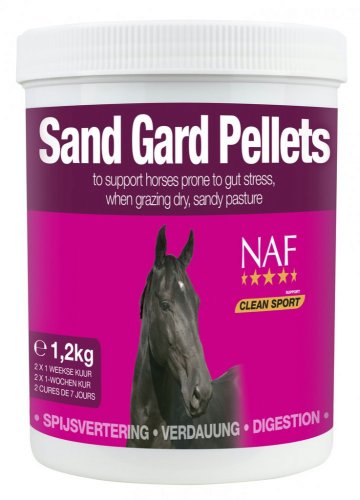NAF Sand gard for horses prone to sand colic with probiotics, psyllium and vitamins 1.2 kg
NAF Sand gard for horses prone to sand colic with probiotics, psyllium and vitamins 1.2 kg
NAF Sand gard for horses prone to sand colic with probiotics, psyllium and vitamins 1.2 kg ... Read More
Manufacturer: NAF Product code: 721041120 Shipping and Payment
NAF Sand gard for horses prone to sand colic with probiotics, psyllium and vitamins 1.2 kg ... Read More
Manufacturer: NAF Product code: 721041120 Shipping and Payment
Horses and ponies naturally eat sand and soil while grazing. The smaller amount that passes through the digestive tract is normally harmless. However, animals that graze mainly on dry and sandy areas run the risk of ingesting too much sand and dust. Then dangerous sand colic can occur. In these cases, we recommend feeding NAF Sand Gard as a seven-day course once a month.
Sand Gard Pellets are tasty and easy to feed, promote healthy bowel movements (bowel peristalsis) and provide herbal ingredients to naturally 'expel' excess that has built up in the gut.
They also provide live probiotic yeast to support a healthy population of microflora in the gut. Sand Gard Pellets can be fed regularly for long-term maintenance of optimal gut health in horses that can ingest large amounts of sand from the ground.
Psyllium husks are especially useful. The peel contains swelling substances. When they come into contact with liquid, they form a slimy paste. It absorbs unwanted sand and, together with the intestinal contents, helps to transport it out.
What is sand colic? Sand colic occurs when horses are kept on heavily eroded pastures or sand paddocks for too long. Consuming forage from sandy soils also promotes sand colic, as the horse ingests more soil and sand along with grazing. Danger: A horse's intestine is about 30 meters long and has numerous coils. Sand and soil can build up there and clog the intestines. Sand also irritates the mucous membrane. All of this can cause colic and fecal water (kotwasser).
Ingredients: Psyllium seed, plantain leaves, brewer's yeast, carrots (dried), omicha berries, rosehip skins, milk thistle seeds, turmeric, dandelion leaves, rosemary, chlorella (dried), mushrooms (dried), ginger, ginkgo leaves, licorice, rapeseed oil.
Additives per 1kg:
Vitamins: Vitamin E 3a700 500 I.U.
Digestibility Enhancer: Saccharomyces cerevisiae CNCM I-4407 4b1702 5.0x1010 cfu
Emulsifiers: Hydrolyzed lecithins 1c322ii 2,000 mg
Carrier: Bentonite 1m558i 300,000 mg
Analytical constituents: Crude protein 13.4%, crude oils and fats 4.2%, crude ash 29.2%, crude fiber 12.5%, sodium 0.33%, acid-insoluble ash 21.9%
Feeding instructions: Feed Sand Gard wherever there is visible mass build-up in the gut or when grazing on dry, sandy pasture. For picky horses, introduce to the ration gradually. For best results, feed as a 7-day course once a month.
Horses and ponies g per day scoops per day:
Day 1: 38g
Day 2: 76g
Day 3-4: 114g
Day 5-7: 76g
Packaging: 1.2 kg bucket


